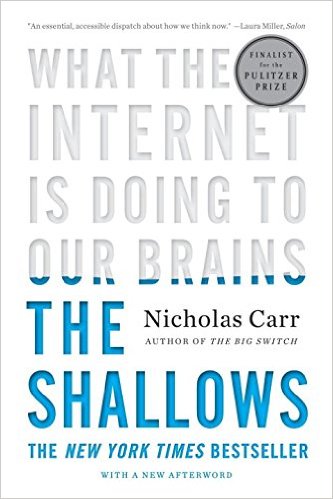
The Shallows: What the Internet is Doing to Our Brains
By: Nicholas Carr
Book Report by: Bryn Clark
Point 1: We are losing our ability to concentrate
“Calm, focused, undistracted, the linear mind is being pushed aside by a new kind of mind that wants and needs to take in and dole out information in short, disjointed, often overlapping bursts- the faster the better.” (10)
Point 2: How we use our brain affects it’s physical and physiological characteristics
Our minds are shaped by the way we use it and the way in which we expose our brain to information and tasks. This notion is known as “neuroplasticity.”
Nietzsche: “Our writing equipment takes part in the forming of our thoughts.” (19)
“Every action leaves some permanent print on the nervous tissue.” (21)
Related aside: Another interesting read on this notion of mind pathways is: Wired for Intimacy: How Pornography Hijacks the Male Mind. In this book, Dr. William Struthers shows how- similar to many other addictions- a thought, emotion, or physiological reaction makes a ‘pathway’ in the mind. Think of this pathway as a trail someone walks over very fragile vegetation. Each time a similar thought, emotion, or physiological reaction ‘walks’ down that pathway, it becomes smoother and easier to travel.
“Evolution has given us a brain that can literally change its mind- over and over again.” (31)
Carr quotes one scientist who says: “If we stop exercising our mental skills, we do not just forget them, the brain map space for those skills is turned over to the skills we practice instead.” (35)
A real-life example of this is a study done on NY taxicab drivers. Previous to the invention of GPS, many drivers scored incredibly high on the IQ scale. Surveys and data drawn since the massive implementation of the GPS shows a drastic decrease in short-term memory abilities and overall intellect.
Point 3: Our changing brains may be changing our ability to think deeply
Similar to how a muscle that is unused will dwindle and weaken, so a mind that is unused will lessen in its ability to think deeply or absorb significant and qualitative amounts of information.
Because of the internet’s information distribution that’s a mile wide and an inch deep, we don’t often have to work through the task of reading and interpreting a text. And:
“As the brain becomes more adept at decoding text, turning what had been a demanding problem-solving exercise into a process that is essentially automatic, it can dedicate more resources to the interpretation of meaning. What we today call ‘deep reading’ becomes possible.” (63)
“Developing such mental discipline (is) not easy. The natural state of the human brain, like that of the brains of most of our relatives in the animal kingdom, is one of distractedness.” (65)
Carr points out the worrisome reality behind the increased illiteracy of America’s youth when it comes to actual books:
“The reading of a sequence of printed pages was valuable not just for the knowledge readers acquired from the author’s words but for the way those words set off intellectual vibrations within their own minds. In the quiet spaces opened up by the prolonged, undistracted reading of a book, people made their own associations, drew their own inferences and analogies, fostered their own ideas. They though deeply as they read deeply.” (65)
Memorization- in Biblical and up through Medieval to pre-Gutenberg time, was not for brute repetition or regurgitation. Rather, memorization was seen as a way of absorbing knowledge into the stores of information already within one’s brain. To memorize the book of John was to connect the book of John with the memorized portions from the book of Genesis and develop the ability to articulate a Biblical theology that goes beyond simply reciting Bible verses here and there.
Point 4: The mediums we prefer contribute to these changes in our brains
Because of the way a webpage features thousands of different messages at one time- the main article, an advertisement up top, down below, a pop-up here, another advertisement that changes on the right hand of the page, etc.- reading on the internet is inherently distracting and necessitates the brain to interact with information in a shallow manner.
Between 2005 and 2009 the amount of time an average adult spent online each day doubled.
Not including time on mobile devices and phones, a 2008 international survey of 25,00 adults between the ages of eighteen and fifty-five found that people are spending 30 percent of their leisure time online. (86)
According to a 2009 study most Americans, no matter what their age, spend at least eight and a half hours a day looking at a television, a computer monitor, or the screen of their mobile phone. Frequently, they use two or even all three of the devices simultaneously. (87)
“It’s possible to think deeply while surfing the Net just as it’s possible to think shallowly while reading a book, but that’s not the type of thinking the technology encourages and rewards.” (116)
“With the exception of alphabets and number systems, the New may well be the single most powerful mind-altering technology that has ever come into general use.” (116-117)
Point 5: Everyone should send their children on La Vida trips and donate hundreds of thousands of dollars to the La Vida ministries. (Carr’s words) (sorta)
A series of psychological studies over the past twenty years has revealed that after spending tie in a quiet rural setting, close to nature, people exhibit greater attentiveness, stronger memory, and generally improved cognition. Their brains are both calmer and sharper. (219)
“The more distracted we become, the less able we are to experience the subtlest, most distinctively human forms of empathy, compassion and other emotions.” (221)
“Our ability to engage in ‘meditative thinking’…the very essence of our humanity, might become a victim of headlong progress.” (222)
“One college senior sent me a long email describing how he has struggled with ‘a moderate to major form of internet addiction’ since the third grade. ‘I am unable to focus on anything in a deep or detailed manner,” he wrote. ‘The only thing my mind can do, indeed the only thing it wants to go, is plug back into that distracted frenzied blitz of online information.” He is drawn back into the web even though he knows that ‘the happiest and most fulfilled times of my life have all involved a prolonged separation from the internet.’” (227)
This makes outdoor, experiential education that is consistently disconnected from modern technology not simply a ‘luxury’ or worthwhile hobby but a very necessary antidote to the power of technology over our brains.
What I’ve changed because of this:
- Each work day, I complete tasks in “blocks.”
- I work on a single task or area of my job, and solely on that task- even at the negligence of other tasks– for a specifically scheduled amount of time.
- I close my email most of the day, only opening it to read during times that it applies to the task at hand or I’ve set aside for reading emails
- I used to read numerous books at once. Now I only read one fiction and one theology book at a time. Whereas previously I would take an hour of reading and divide it between four books- now I use that entire time to read one book. I’ve been reading faster and absorbing more since I started doing this.
- I listen to full albums on Spotify more often than mixes. I’ve found that my mind can be a little more disjointed and even ‘stressed’ by hearing a variety of different sounds and having to process those while also working.
- I downloaded the Freedom application for my laptop. This allows me to block different websites or all network connection for a set amount of time. It’s pretty impossible to work around once you’ve begun a session, so it does force you to streamline what you’re doing.
- I made a commitment to donate the total value of my trust fund to La Vida.
